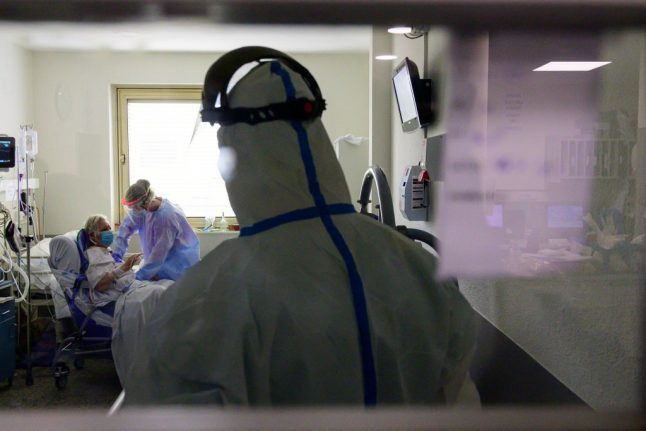But a second wave of the Covid-19 outbreak is already under way in Spain, straining the capital's public health care system.
Around 400 builders have been working round the clock since July to build the 45,000-square-metre (484,000-square-foot) Isabel Zendal hospital, which will be able to care for over 1,000 patients during a health emergency.
Concrete mixers churn at full speed at the vast building site as welders set off sparks from the pillars which will form the backbone of building.

Photo: AFP
“Two months ago there was nothing here,” said Alejo Mirando, the director general of health infrastructure in hardest-hit Madrid region.
The regional government of Madrid is spending over 50 million euros ($60 million) to build the hospital, which will have bay windows which will allow doctors to monitor patients without becoming contaminated and large halls without individual rooms.
The architecture was designed to “avoid transmission” of viruses and it was inspired by the design of a temporary field hospital set up at Madrid's sprawling Ifema exhibition centre between March and May, said Mirando.
The opening of the new hospital however will come too late to deal with a surge in infections in the Madrid region, which Prime Minister Pedro Sanchez has called “worrying”.
'Verge of collapse'
Spain was one of the hardest-hit countries when the coronavirus struck Europe this year before a strict lockdown helped reduce the outbreak's spread.
But infections have surged since the lockdown measures were fully removed at the end of June, especially in Madrid, with the rise in infections often linked to the return of nightlife and social gatherings.
The region, which is home to around 6.5 million people, accounts for 73 of the 191 Covid-19 deaths recorded in Spain in the last seven days, and for nearly a third of the country's total toll of 29,000 deaths.
The rapid pace of the rise in infections is “similar to that at the beginning of the pandemic,” said Silvia Duran, a spokeswoman for doctors' union Amyts.
Public health centres are so far managing to contain the second wave but hospitals are preparing for a rise in admissions, she added.
Covid-19 patients already fill 16 percent of all hospital beds in Madrid, compared to just six percent nationwide.
“We are on the verge of collapse,” said Jose Molero of the Csit union, adding doctors are “exhausted” because they are seeing up to 60 patients per day.
“The next stage will be when people go directly to the hospital because they can't be seen by their family doctor,” he added.
'High risk area'
Densely populated Madrid, Spain's transport hub, is “a high risk area”, the health ministry's emergencies director Fernando Simon said on Monday.
While the Madrid region's deputy health chief, Antonio Zapatero, acknowledged that infections have risen during the past month and a half, he said the “situation is bearable at the moment”.
Governed by the conservative Popular Party, the region has taken up the leftist central government's offer to send soldiers to help track people who have been exposed to those infected with virus.
But some health experts feel the region is still not doing enough.
A doctors group is planning to file a lawsuit against the regional government while hundreds of other doctors have signed an open letter demanding that the regional government “act to avoid a new collapse” in the health system.
Among the demands of health care workers is greater use of telemedicine.
“It is us who are going to get sick,” said Duran of doctors' union Amyts.
She recalled that in April healthcare workers accounted for around 20 percent of all Covid-19 cases in Spain, the highest proportion in the world, according to the European Centre for Disease Prevention and Control.
By AFP Marie Giffard



 Please whitelist us to continue reading.
Please whitelist us to continue reading.
Member comments